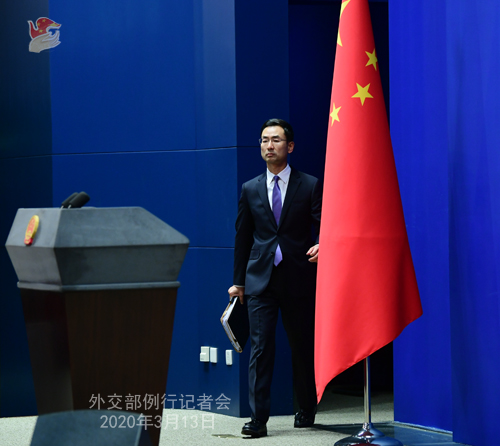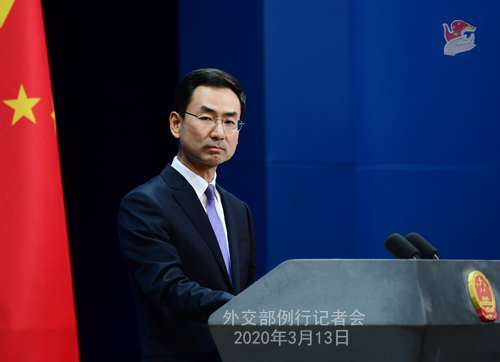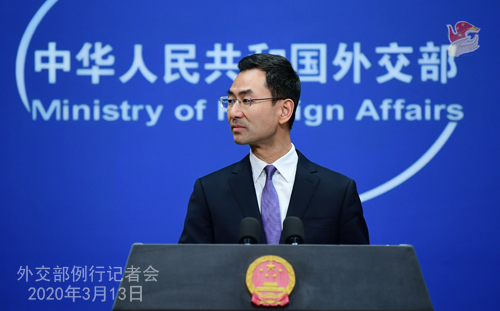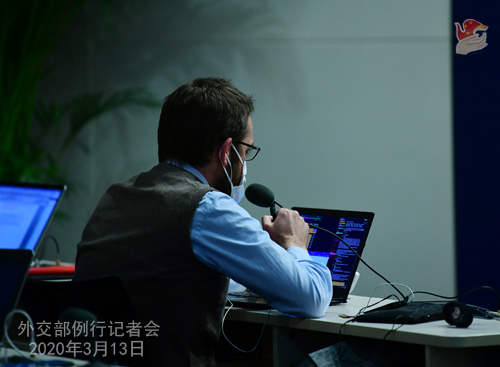| Foreign Ministry Spokesperson Geng Shuang's Regular Press Conference on March 13, 2020 |
| 2020-03-13 21:56 |
|
According to the latest figures from the NHC, March 12 saw 1,318 patients cured and discharged from hospital in China's mainland, bringing the tally to 64,111. Q: The second sherpas' meeting of the G20 Riyadh Summit was held yesterday followed by a statement on COVID-19. Do you have any comment? A: COVID-19 is now a pandemic. As a major international forum for economic cooperation and a mechanism in response to major global crisis, the G20 has special significance in enhancing international cooperation and response against the pandemic. Building on the recent statement of G20 finance ministers and central bank governors, the G20 sherpas again send a strong signal of solidarity and cooperation to the world by their collaboration and consensus, which will help boost market confidence and international commitment. China played an active role in the drafting and issuance of the statement. Here I'd like to stress the following three points. First, since the pandemic knows no borders, the only right thing for the world to do is making concerted efforts. No country can keep itself away from the spread of the virus. We must overcome the difficulties together upholding multilateralism and the vision of building a community with a shared future for mankind. We must inject positive energy into global cooperation by opposing unilateralism, finger-pointing and stigmatization. Second, we support the G20 in once again leading international efforts against the pandemic. We must use all necessary fiscal, financial and structural policy tools to coordinate macro-economic policies at both demand and supply sides to promote the strong, balanced, sustainable and inclusive growth of the world economy. Third, we firmly safeguard an open world economy. Measures taken by countries will inevitably impact trade and investment, but we must do our best to ease tensions in international trade, remove unilateral tariffs and jointly protect global industrial and supply chains from disruptions. Through the G20 and other multilateral platforms, China will continue working with the international community to fight the epidemics. With the joint efforts of all countries, the victory will be ours. Q: Some say it might be the US army who brought the epidemic to Wuhan. How do you comment on that? A: In recent days we noticed many discussions on the origin of the COVID-19. We firmly oppose the unfounded and irresponsible comments made by certain high-level US officials and Congress members on this issue to smear and attack China. The fact is, there are different opinions in the US and among the larger international community on the origin of the virus. China believes it's a matter of science which requires professional and science-based assessment.
Q: We saw reports that Beijing has announced to donate supplies to help Seoul, Tokyo, Yokohama and Tehran fight COVID-19. Do you know when the supplies will be delivered? A: Yesterday officials from the Foreign Affairs Office of Beijing Municipality talked about the donation at a press conference on epidemic prevention and control. I understand Beijing has been in close contact with friendly cities including Seoul, Tokyo, Yokohama and Tehran on COVID-19. At present these cities are facing an overwhelming challenge with strained resources for epidemic response. Beijing relates to their difficulties. It has decided to donate supplies to the four cities while meeting local needs to fight the virus. As we learn from the Beijing municipality, the supplies for Tehran have been delivered through Iran's embassy in China, and the donations for other cities will soon be sent. I would like to point out that the virus is the common enemy of mankind and the pandemic knows no borders. The donation of prevention and control supplies by the Beijing municipality is the epitome of the assistance Chinese local governments provided to foreign cities. Recently, the local governments of Shanghai, Shandong, Zhejiang, Jiangxi, Jilin, Anhui, Jiangsu and Henan have also provided material support for epidemic prevention and control to foreign countries via their sister cities. China stands ready to provide assistance to the best of its capacity to countries in need while making every effort to combat the epidemic at home. Q: We learned that China and the ROK today established a cooperation mechanism for joint prevention and control against COVID-19, and its first video conference was held. What is China's comment? A: This morning, the China-ROK cooperation mechanism on joint prevention and control of COVID-19 was formally established and held its first video conference.The Chinese side has released a readout. The COVID-19 outbreak is a severe challenge faced by the international community. Since the outbreak of the epidemic, China and the ROK, as close neighbors sharing weal and woe, have shown care for and offered sincere help to each other, which fully demonstrates the friendly sentiments featuring mutual assistance and solidarity. While making epidemic response at home, the two countries have strengthened exchanges and cooperation between departments and adopted a series of effective joint prevention and control measures. On this basis, it is very timely and necessary for China and the ROK to establish a joint prevention and control mechanism in response to latest developments in both countries and beyond. This is not only a positive measure to implement the important consensus reached by the two heads of state, but also serves as a reference for other countries to join hands to fight the epidemic. The first meeting of the mechanism this morning was efficient and results-oriented. Both sides appraised the epidemic response in the two countries and the exchange and cooperation conducted between their corresponding departments earlier, and discussed priorities and specific measures to strengthen joint prevention and control efforts in the next stage. Broad consensus was reached on reducing unnecessary movement of personnel, stricter border control on "four types of people" (confirmed cases, suspected cases, people who have close contact with the former two, and those who have fever), exchange of prevention and control guidelines as well as diagnosis and treatment technology, and taking good care of each other's overseas nationals, including international students. We hope both sides can make good use of this mechanism and the channels between corresponding departments to further strengthen communication and coordination in joint prevention and control endeavors in a bid to overcome the epidemic at an early date, improve the health and well-being of the two peoples, and maintain and promote bilateral exchanges and cooperation.
Q: Is it the Chinese government's position that it might be the US army who brought the epidemic to Wuhan? A: I talked about China's position earlier. There are different opinions in the US and among the larger international community on the origin of the virus. China believes it's a matter of science which requires professional and science-based assessment. Q: Venezuelan President Maduro said on March 12 that US sanctions have severely undermined the country's epidemic containment, asking the US to immediately lift its unjust, illegal sanctions. On the same day, however, the US Department of Treasury announced its decision to sanction TNK Trading International, subsidiary of a Russian oil company that trades oil with Venezuela. Do you have any comment? A: It is known to all that the US sanctions on Venezuela have severely worsened the country's economy and people's life, making medical accessibility and other domestic issues more prominent. At this critical juncture where all governments and people across the world are fighting the pandemic, the US is still stubborn in sanctioning Venezuela, showing not the least respect for humanitarianism. China has been calling for peaceful resolution of the Venezuelan issue through dialogue, as well as conditions for the country's normal development. We oppose foreign interference, unilateral sanctions and so-called long-arm jurisdictions. We call on the US to join international efforts, stop interfering in Venezuela's internal affairs and remove unilateral sanctions at the earliest time possible, which will contribute to Venezuela's peace, stability and development.
|




